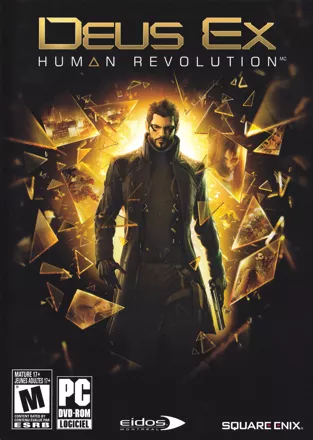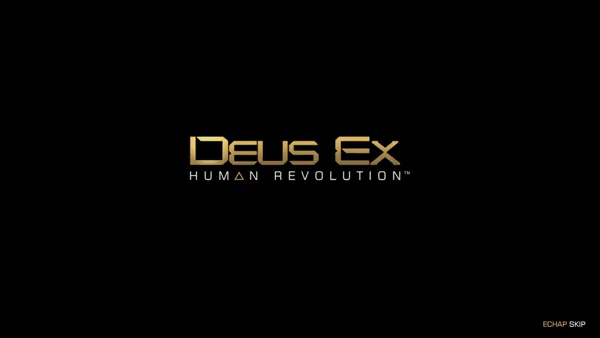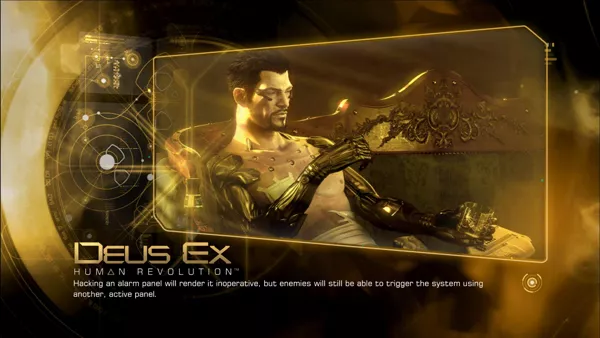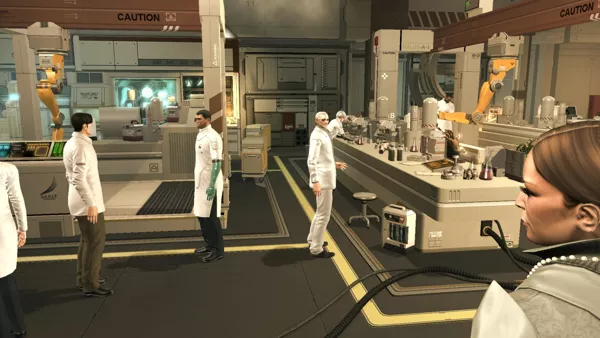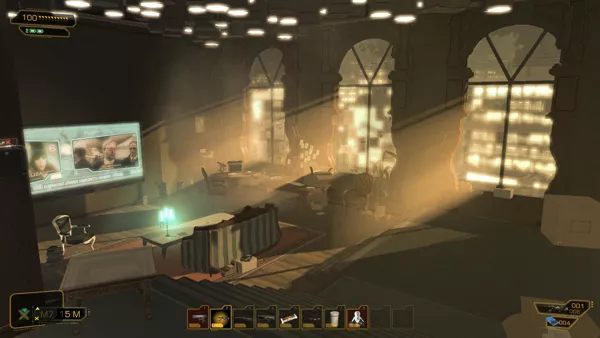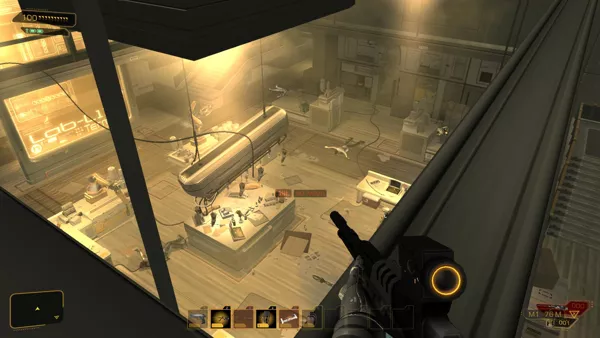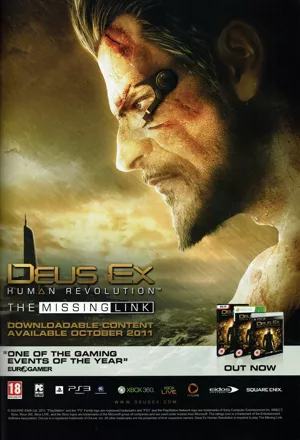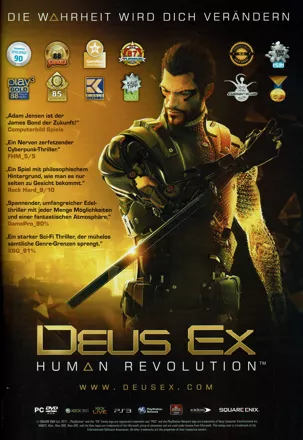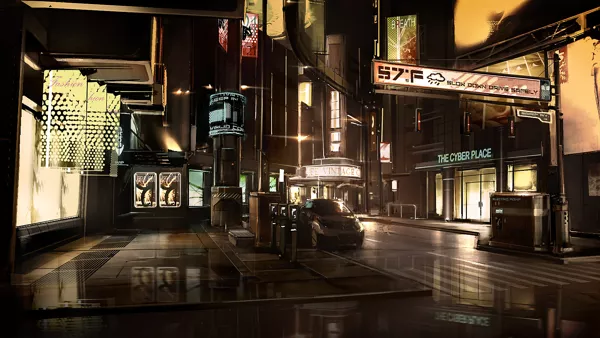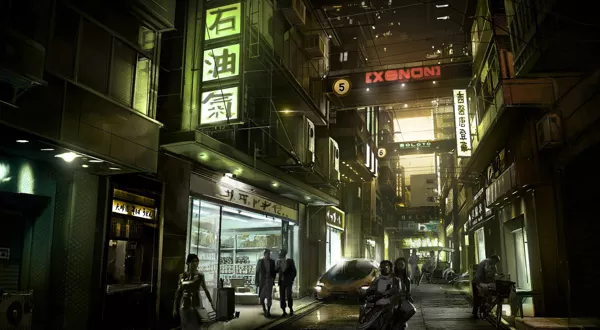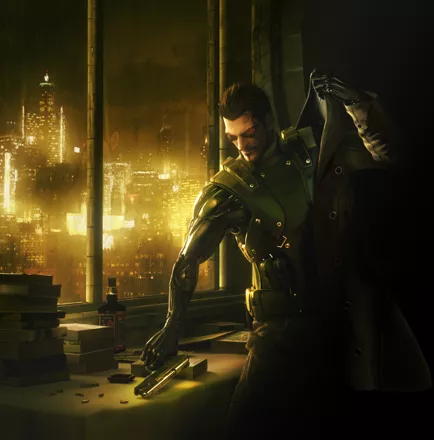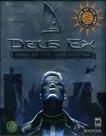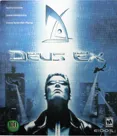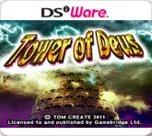Deus Ex: Human Revolution
Description official descriptions
In a near future dominated by chaos, conspiracies, and biomechanical augmentations, society is divided by various organizations fighting for supremacy, and large corporations extending their power beyond those of governments. An ideological war is growing between people who accept the biotechnological progress and people who fight it. A human revolution is coming.
Adam Jensen is a thirty-four-year-old ex-SWAT member from Detroit, enrolled by a powerful biotechnology company named Sarif Industries. His job is to ensure the scientists' private security and safeguard the secrets of the company's projects. The first day after his hiring, Adam Jensen is about to attend a meeting with David Sarif, the founder and CEO of Sarif Industries, when suddenly a red alert is issued in the company laboratories. A troop of mercenaries, apparently working for Belltower Associates, breaks in and kills several scientists. After having neutralized some of the mercenaries, Adam is severely injured by one of them. He has no choice but to be enhanced with biomechanical augmentations to save his life. His goal is now to discover what were the motivations of the attackers and unravel a greater conspiracy behind their actions.
Deus Ex: Human Revolution is the third game in the Deus Ex series. The events of the game take place in the year 2027, twenty-five years before those described in the first game. Like the first installment, the game is a hybrid of a 3D shooter with a stealth angle and role-playing. All styles of play can be adopted to succeed in the missions, from a totally furtive mode (some bonuses are granted in case the player character hasn't been detected during the whole mission) to the most brutal one. The player's decisions may have an impact on the storyline.
The game offers a vast array of weapons and biomechanical augmentations (hacking, social, stealth, sight, armor, combat skill enhancements, etc.). Various amounts of experience points are awarded for completing main or secondary quests, avoiding or eliminating enemies, hacking, reading electronic books, and discovering secret passages. After having accumulated a certain quantity of experience points, the player is awarded a "praxis kit", which can be manually used to learn or improve an augmentation. These kits can also be found during exploration or purchased in clinics.
Role-playing elements include, besides augmentations and general character-building, exploration of non-hostile areas and dialogue with non-playable characters. During certain crucial moments, the player will have to participate in a "conversation battle" with a key character, selecting the correct psychological approach and influencing subsequent plot events.
A few modifications have been made to the shooting gameplay, emphasizing its tactical aspect. The third-person cover system is integrated into otherwise fully first-person gameplay. Enemies often appear in groups led by a commander; taking out the latter may demoralize enemies, making them easier targets. Though the game still contains health-restoring items, the protagonist's health regenerates itself over time.
Spellings
- デウスエクス - Japanese spelling
Groups +
- 3D Engine: Crystal Engine
- Censored Japanese releases
- Covermount: Level (Romania)
- Deus Ex series
- Gameplay feature: Body dragging
- Gameplay feature: Character development - Skill distribution
- Gameplay feature: Grid Inventory
- Gameplay feature: Multiple endings
- Games made into books
- Games made into comics
- Games with 451
- Games with Dopefish
- Middleware: FaceFX
- Middleware: Scaleform GFx SDK
- PlayStation 3 Essentials Range releases
- Protagonist: Cyborg
- Setting: 2020s
- Setting: City - Detroit
- Setting: City - Singapore
- Software Pyramide releases
- Theme: Hacking / Pseudohacking
- Xbox 360 Classics releases
Screenshots
Promos
Videos
Add Trailer or Gameplay Video +1 point
See any errors or missing info for this game?
You can submit a correction, contribute trivia, add to a game group, add a related site or alternate title.
Credits (Windows version)
502 People (449 developers, 53 thanks) · View all
| Producer | |
| Game Director | |
| Art Director | |
| Audio Director | |
| Production Manager | |
| Animation Director | |
| Art Direction Presentation | |
| Lead Animator | |
| Technical Director Animation | |
| Animators | |
| Rigging/Skinning | |
| Additional Animation | |
| [ full credits ] | |
Reviews
Critics
Average score: 89% (based on 76 ratings)
Players
Average score: 4.1 out of 5 (based on 125 ratings with 6 reviews)
The Good
Looking back and comparing two decades - the 1990's and the 2000's - I came to the conclusion that the former was a richer, more creative, and decidedly more innovative period of game-making. Sure, the last decade has seen its share of great games. Its biggest contribution was probably the popularization of open-world driving action; but particularly in the field of FPS / RPG hybrids, we've only been awarded with the rare delight that was Bloodlines, and saw how Fallout 3 diligently tried to break the mold. When the first Deus Ex came out, I thought that it would propel gaming into the new decade, century and millennium with its ingenious genre blend. But it didn't happen. Games didn't follow its example; even its own sequel, though still a good game, shrunk in size and scope, intimidated by the "streamlined" (read: dumbed-down) style that unfortunately became too prominent in modern gaming.
And just when I became convinced that the glorious past has been cast into oblivion, Deus Ex: Human Revolution appeared. Like a phoenix raising from the ashes of its grandfather, this game restored my faith in a better future for video games. An audacious, daring project by an inexperienced team turned out to be a grandiose achievement that instantly conquered the hearts of those who longed for deep and intelligent gameplay perfected by the first game.
Human Revolution is what most modern games are not. Small playing field, simplified gameplay mechanics and linearity are just the opposite of what this game offers. It is a vast, rich, fulfilling, clever game obviously created by people who aimed to please those who enjoyed the first Deus Ex. It is as if they have dedicated all their time and effort to studying the original game and then created a modern version of it, injecting it with a distinct personality and even correcting and enhancing what the first game lacked.
Granted, these corrections and enhancements mostly refer to significantly prettier environments, less moronically behaving (but still not very bright) enemies, locals who actually speak their own language (the Chinese speak impeccable Mandarin!) and some interesting, but minor additions such as the cool hacking mini-game (BioShock, Mass Effect and Alpha Protocol: watch and learn). For the most part, Human Revolution is typical, good old Deus Ex: crawl through vents, try not to set off the alarms, deal with pesky turrets, happily gather experience and spend it on modifying your character, all while enjoying a conspiracy story starring a softly speaking cybernetically enhanced super-agent. The concept is hardly new; the brilliance is in the execution.
The game simply does so many things right that it becomes painful to look at all those other games and wonder why they couldn't do the same. Disregarding a certain graphical monotony (which has become a Deus Ex tradition by now), level design in Human Revolution is absolutely stellar. A special award should go to whoever designed the city hubs. First of all, those areas are huge. Not only the claustrophobic corridors of Invisible War, but even the vast environments of the first game cannot compare to what you see here. Hell's Kitchen is smaller than Detroit; Hong-Kong is just a village compared to Hengsha. The latter, by the way, is positively amazing. This breathtaking, sprawling city that takes hours to explore to the full is one of the most awe-inspiring areas I have ever seen in a video game; a chunk of tasty, delicious gaming meat to sink your teeth into.
Hostile areas are on par with the hubs: large, complex, and interesting to explore. There is an enormous amount of optional rooms to visit. There are tons of things to do and find everywhere. Discovering secret passages, hunting for rare and valuable items, fooling around with security devices, planning alternate routes, reading other people's e-mails - there is no end to it, and it's always rewarding. Human Revolution casts you into a generous, fascinating, detailed world, and you can take a break from the storyline's goals at any time - just hang around, chat with people, enjoy just being there.
Invisible War did away with RPG elements; Human Revolution triumphantly brings them back. In fact, in some ways this game is more of an RPG than the first one. Everything is now awarded with experience points, and the game marvelously conveys a feeling of constant growth and achievement. Hacked a security terminal? Got experience. Pushed away a candy machine and discovered a vent behind? Got experience. Shot an enemy in the head? You are "Marksman"; 10 XP. Tackled an enemy in melee? More experience for non-lethal takedown. Completed a whole level without triggering alarms? "Smooth Operator" achievement, XP reward. You aren't just allowed to accommodate the game to your own playing style; you are being rewarded for whatever style you choose, at the same time gently reminded that another, harder way might be even more rewarding. This is pure design excellence.
Want more role-playing? There are interesting side quests that are more numerous and involving than in both predecessors. You are prompted to make moral decisions not only to determine the game's ending, but also at various points of the story. Dealing with a hostage situation, saving your partner's life at the risk of jeopardizing the mission - there are all kinds of tough situations that provide delightful role-playing. On top of that, the well-written, psychologically astute "conversation battles" add even more depth to the role-playing. From time to time, you'll have to engage in mental duels against prominent characters in the game, defeating them by selecting dialogue options divided into various approach patterns. Winning or losing such a "battle" is in many cases a matter of life and death. And of course, the game's ending depends on your support towards a certain ideology, just like in the previous installments.
The story in this game is, frankly, a bit of a mixed bag. We've seen very similar stuff in the two previous games; furthermore, it is hampered by a few out-of-place sequences that make the narrative uneven in quality. However, there is still plenty of gold to be found in this story. Most of the dialogue is clever and well-written (and well-acted, for the first time in the series); major characters are convincingly portrayed; grand conspiracies and philosophical undertones still inspire and make us think. It is perhaps not the best story ever conceived for a video game, but it is still more interesting and competently executed than most of the other stuff out there.
The Bad
No game is perfect, and Deus Ex: Human Revolution has its (very small) share of dubious design choices. I can already hear everyone scream "boss battles!"; while I do join the cry, my reasons are perhaps a bit different. Honestly, I didn't hate the boss battles themselves. It's nice to have an adrenaline rush after hours of methodical exploration, sneaking, hacking, vent-crawling, accurate headshots, and other predominantly cerebral (in video game terms) activities. However, what bothered me in those battles was their almost complete detachment from the game's story, their discrepancy with the game's tone. You defeat four or five circus freaks who might have just barely failed an audition for correspondent roles in a Metal Gear Solid game. Those people either say nothing at all or blurt out painful B-movie-esque phrases that tarnish the game's intellectual image. By far the worst characters in the game are those bosses; it is as if a different person with clearly inferior skills wrote their dialogues that somehow got through the testing and made it into the final version. Were the developers afraid that their game turned out to be too mature and intelligent? Was it a nostalgic throwback to arcade times? A nod to the Japanese enforced by the mighty publisher? Here is another fertile ground for conspiracy theories.
I missed melee weapons; but even more than those I missed interactivity. This was, for me, the game's most disappointing aspect. Its two predecessors had marvelous physics systems that allowed you to manipulate pretty much everything you saw. Sadly, in Human Revolution this interactivity is restricted to a few repetitive objects: crates, soda machines, and an occasional stand-out item such as the traditional basketball. The graphics in the game are very detailed; but for the most part, what you see are mere decorations.
The Bottom Line
Deus Ex: Human Revolution gives us what we've been craving for: smart, classy, generous gaming. It elegantly recreates the greatness of the first game, boldly fulfilling the tremendous expectations. Above all, it proves that the groundbreaking achievements of its progenitor (and also of System Shock and even Ultima Underworld games before it) have not vanished; the great tradition lives on in this modern classic. Along with Fallout: New Vegas, it is a bright beacon that illuminates the way into the new decade, and an example of what modern game designers should strive for.
Windows · by Unicorn Lynx (181780) · 2011
The Good
What I liked most about Human Revolution is how the developers exercised a good deal of moderation in dumbing it down. For example, they introduced regenerating health, which is normally considered a dumb feature, but they also made the weapon damage high and the regeneration slow, thus negating some of the dumbness. They removed skills, but deepened augmentations. And so on... Overall it's nowhere near the disaster Oblivion or BioShock were.
In some ways, it's better than the first Deus Ex. The dialogues are deeper, and there seem to be more choices and consequences (I only finished it once), the graphics are of course a lot more detailed, and the engine renders the atmospheric environments well. I liked it a lot better than the shiny Unreal3 look from other contemporary games. Performance is fine too (at least on DX9.)
Aesthetically, it's quite pleasing. The Detroit area is the weakest. The other hub has some beautiful environments, and the missions have their striking moments too (except a certain dock mission, which is both visually boring and poorly motivated).
The side quests are interesting. Most of them somehow tie into the augmentation debate - the brainwashed mercenary-assassin who starts killing his employers, the prostitutes who are forced into augmentations to enhance their clients' pleasure (yikes), etc. They are comparable or better than anything the original had to offer.
The Bad
What bothered me the most was that they changed the gray, realistic visuals from Deus Ex into something that reminds me more of cyberpunk anime, which makes it lose some of its impact. For example when a character talks about private security forces as 'capitalism's final encroachment into one of the most lucrative industries' it's actually quite a deep thought that's relevant to our modern world, but because it's said by a cartoonish character in a cartoonish world, it will hardly register.
Then there are the three unavoidable boss fights that happen in small rooms and can only be defeated by shooting them long enough (and it does take a long time). I don't know why they put these in. Deus Ex is about being sneaky and clever. It's not about shooting a tank-like character in the face fifty times while dodging infinite bullets and grenades. It's almost like fighting bosses in a platformer.
Then there's the small stuff, like the third person cover and take-down mechanics, the much more game-y interface, the use of a quest compass (which is useful, but only because the map is so useless), lack of detailed locational damage, skills, lockpicks, etc.
The main storyline events are really dumb. For example, at one point, you have to figure out a freighter's destination. Well, we're the head of security of a mega-corporation in a cyberpunk setting, so how will we approach this? Will we attach a tracking chip to the ship? Will we watch it from orbit? From a plane? No? A boat then? How about hacking a computer for the schedule, or interrogating a dock worker with our arm blades? Nope, hobo Jensen decides he's going to hide in a cargo container to see where it's going.
The Bottom Line
It's... okay. It's better than Deus Ex in some ways and worse then Deus Ex in some ways. In most ways it's the same - and that's the problem. It's been ten years since DX1 came out, and one expects a certain amount of progress and increase in depth which Human Revolution hasn't delivered. It could've been more open, the world could've been more reactive, it could've partly simulated an economy and ecology, whatever. It could've been different, but instead it is too much of the same.
Windows · by dorian grey (243) · 2011
The Good
It is sad to see that Eidos jumped on the bandwagon with their flagship RPG series, and went the Bioware route. Meaning that first they kickstart an awesome, intricate, deep RPG franchise, then they proceed to ruin it to oblivion in its sequel(s) which end up being glorified First Person Shooters with mild RPG touches and very non-RPG-ish boss fights. FPS's are easier to develop and easier to market to the teen crowd, so I see the incentive. But really, what's next? Deus Ex 4: The iPhone Arcade Game? Anyway, there's still plenty to like here, so let's see:
This game is strong on atmosphere; sometimes that translates to oppressive, foreboding urban landscapes (Detroit), sometimes to exotic locales that ooze Oriental mystery and intrigue (China). Even the sterile office building interiors in this game are verisimilar and atmospheric.
Another strong point is imagination and immersion: the game dreams up a believable, fairly dystopian 2027 where we witness a widening gap between those who can afford flashy high-tech augmentations and those who cannot. The game takes its elaborate political-scientific-economic setup for granted and builds it from there, remaining very consequential and serious throughout in its depiction. No lazy shortcuts, no deal-breaking wink-wink-nudge-nudge allusions to the present day as a lesser sci-fi game would resort to. DE:HR is a mature attempt at imagining a possible, persistent 2027. In this regard, it is up there with Blade Runner's 2019 and Mass Effect's 2183.
As a consequence of the above, all the dialogs and the characters are very good, almost too good for an action RPG. Sarif is my favorite example: a charismatic, enigmatic leader and a love-hate father figure to our hero, he always has another revelation or two up his sleeve. The conversations in general are multi-layered, eloquent, emotionally mature and unpredictable. They should be good, as they are written by novelist James Swallow and veteran lead writer Mary DeMarle.
On a more technical note, this game has the best cover system I've experienced in an FPS/3PS yet. It's practical, very useful and easy to master. It's even great to look at: whenever Adam leans next to a wall in his aug-sunglasses, silenced gun in hand, and an enemy guard approaches from around the corner (as it occurs dozens of times in the game), it looks just like a shot from some cool sci-fi comics. As far as cover systems go, I hope future action games look at DE:HR and take it from there.
The Bad
This is an FPS. Granted, this is an FPS that can be optionally played as a survival stealth game. Yet it was marketed as an RPG. If it walks like a duck and quacks... you know the rest.
The game actually becomes unapologetic in its FPS-ness by the second half. The focus shifts to sneaking, evading turrets and upgrading your weaponry so you finally have a chance against Jamar and Zhao, the last two bosses.
Oh yes, don't get me started on the boss fights. These are the equivalent of Eidos's ultimate testimony that they WERE thinking on FPS terms with this game.
Then there is the problem of repetitiveness in the second half, again a typical FPS trait.
The Montreal stage is a seemingly endless array of boring office rooms and vent ducts.
Much of the Singapore stage is, surprise, a seemingly endless array of boring office rooms and vent ducts.
The following Panchaea stage, however, is quite brilliant, as if the project leader finally burst out: "Guys, we need to end this one with a bang! No more office rooms and vent ducts, use your head! This is s'posed to be a Deus Ex game!"
It ended up as an odd out-of-place homage to Half Life 1 (and even to Left4Dead), but I loved it.
The Bottom Line
When taken at face value and not as the latest entry of a venerable RPG franchise, DE:HR proves to be a very playable FPS with some RPG elements, in fact it stands out as probably the best of its kind this year. It's much longer and more interesting than other 2011 FPS/3PS titles I've played. Problems arise when we realize that it's supposed to be a full-blooded prequel to Deus Ex. THE Deus Ex. The fact is, Eidos went the safest, trendiest route here and tried to appease both contemporary fan camps: the newer generation of hardcore action afficionados (who were reared on Quake 3 and Half Life 2) and the older generation of actual Deus Ex fans. As Mass Effect 2 and Dragon Age 2 have proved just before DE:HR, you can't have the best of both worlds in RPG gaming: you either go "deep, hardcore RPG" or you're lite and flawed. Deus Ex has just joined the club of flawed game franchises.
And yet Deus Ex: Human Revolution excels in one aspect: give me its memorable vision of a 2027 Shanghai any day.
Windows · by András Gregorik (59) · 2011
Discussion
| Subject | By | Date |
|---|---|---|
| Slipcase | Fred VT (25953) | Feb 18, 2014 |
| Habemus Missingm Linkem! | Slug Camargo (583) | Oct 18, 2011 |
| Guess what was outsourced? | Patrick Bregger (299943) | Oct 9, 2011 |
| First impressions | Unicorn Lynx (181780) | Sep 18, 2011 |
Trivia
References to other games
In Frank Pritchard's office in Sarif Industries there is a poster on the wall with some character art and a title: Final Fantasy XXVII. Considering the fact that the events of Deus Ex: Human Revolution take place in 2027, this prognosis for a future installment in the Final Fantasy series (published by the same company) means that during the 16 years between 2011 and 2027 there will be 13 new Final Fantasy games released.
References to real life
During the arrival cutscene in Montreal, you see Picus Headquarters. The building for Picus Headquarters is modeled after the real-life Olympic Stadium in Montreal. In addition, at a certain point during the level, you overhear a couple of guards talking about the history of the building. They mention how during a concert, a concrete slab fell and crushed concertgoers. While thankfully that never happened in real life, it's a reference to various incidents involving pieces of the concrete structure in Olympic Stadium coming loose and falling off.
References to the game
Deus Ex: Human Revolution was parodied in an episode of "Die Redaktion" (The Editorial Team), a monthly comedy video produced by the German gaming magazine GameStar. It was published on the DVD of issue 10/2011.
Region lock
In August 2011, it was announced that the UK and Russian versions would be region locked. This stirred quite the controversy and after protests the region lock for UK was removed.
Awards
- GamePro (Germany)
- 2011 - #2 Console Action Game of the Year (Readers' Vote)
- PC Games (Germany)
- Issue 01/2012 - #2 Best Game in 2011 (Editors' Choice)
- Issue 01/2012 - #3 Best RPG in 2011 (Readers' Choice)
- Issue 01/2012 - #5 Surprise in 2011 (Readers' Choice)
Analytics
Upgrade to MobyPro to view research rankings!
Related Sites +
-
Deus Ex: Human Revolution
Official website (Multilingual) -
Deus Ex: Human Revolution at eidos.com
Game page on publisher's website (Multilingual) -
IGCD Internet Game Cars Database
Game page on IGCD, a database that tries to archive vehicles found in video games. -
Sarif Industries
Fictive website of Sarif Industries, the protagonist's employee (Multilingual) -
Wikipedia: Deus Ex: Human Revolution
The game profile at Wikipedia (English)
Identifiers +
Contribute
Are you familiar with this game? Help document and preserve this entry in video game history! If your contribution is approved, you will earn points and be credited as a contributor.
Contributors to this Entry
Game added by Tao_.
OnLive added by firefang9212. PlayStation Now added by Sciere. Xbox One added by MAT.
Additional contributors: Unicorn Lynx, JRK, CaptainCanuck, Fred VT, Patrick Bregger, Victor Vance.
Game added August 26, 2011. Last modified February 16, 2024.
